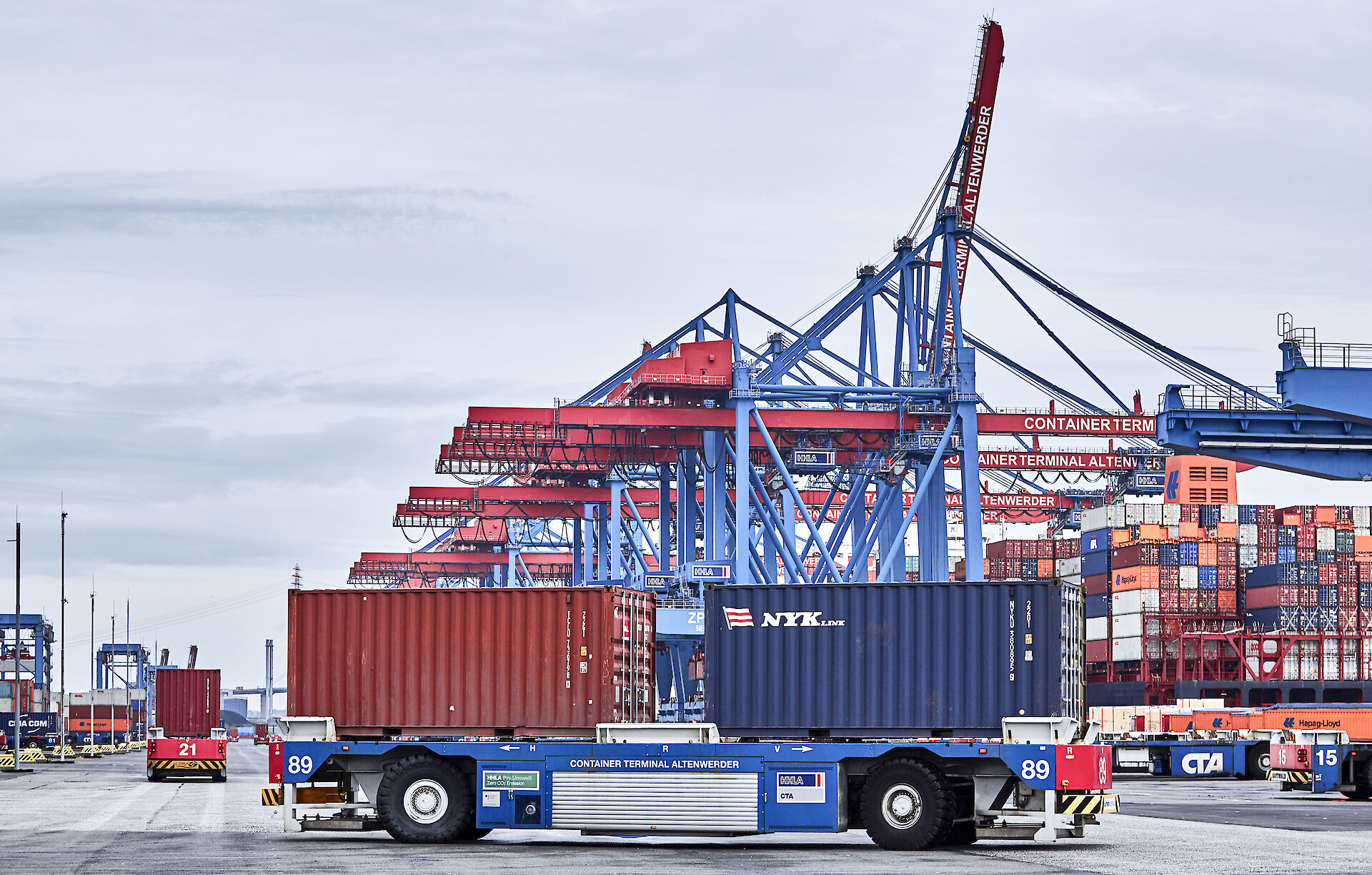It is technically possible and economically sensible to charge batteries for transport vehicles when surplus green power is available within the network. This is the main finding of the BESIC research project which, over the past three-and-a-half years, has transformed the HHLA Container Terminal Altenwerder in the Port of Hamburg into an open-air laboratory for the energy transition.
The HHLA Container Terminal Altenwerder (CTA), automated heavy goods vehicles transport containers between ship and yard. Ten of them run on batteries that are charged with surplus green power. A battery administration system was developed as part of the research project Battery Electric Heavy Goods Transports within the Intelligent Container Terminal Operation (BESIC), which ensures that the batteries in the charging station are always charged at the optimum time from an environmental and operational perspective by exchanging data with Vattenfall’s load forecasting systems and the CTA terminal management system.
The project also demonstrated that managing charging in this way not only made sense from an ecological point of view, but is also interesting from an economic perspective. BESIC has shown that battery-operated automated guided vehicles (AGVs, from Terex Port Solutions) can be operated more economically than diesel/electric AGVs – based on a realistic estimation of energy prices. The cost of purchasing battery-operated AGVs including batteries and a charging station are higher, however over the years they will pay off as a result of lower energy and maintenance costs.
“I am so pleased that at Altenwerder, we were able to demonstrate that an intelligent charging strategy can lead to significant savings in operating costs. This paves the way for related areas of application, such as running electric buses in the public transport network or battery-operated apron vehicles at airports. BESIC has thereby enabled us to make the innovative contribution to the energy transition that we had hoped for at the start,” says Boris Wulff, BESIC project manager at Hamburger Hafen- und Logistik AG’s (HHLA) Container Terminal Altenwerder.
The results of this research project could even reach further major customers in the near future, as Dr. Oliver Weinmann, Managing Director of Vattenfall Europe Innovation GmbH, explains: “The energy transition is meeting Industry 4.0. As part of the BESIC project, we have developed and implemented an automated systems concept with which HHLA can capitalise on its demand flexibility in the energy market and affordably charge its vehicles. What worked exceptionally well at the CTA is now available to highly automated customers throughout Germany.”
The BESIC partners at Altenwerder also tested different batteries to compare them. Lithiumion technology was used in addition to conventional lead batteries. The lithium-nickel-manganesecobaltoxide battery and the lithium-metal-polymer battery both have a capacity of nearly 210 kWh – this is approximately equivalent to ten times the battery power of a small e-vehicle. The lithiumion batteries weigh approximately four tonnes, i.e. only a third of lead batteries. This has a positive effect on AGVs’ energy consumption and energy costs. Compared to lead battery systems, electricity consumption in operative use decreased by more than a fifth. The use of lithiumion batteries in field tests gives reason to reconsider the previous battery strategy. To this, the Energy Research Centre in Lower Saxony (EFZN) has already started work on a new research project. The project has been running since 1 November 2016 at the EFZN’s battery test centre in Goslar and is led by Prof. Hans-Peter Beck.
The BESIC project, which was kicked off in January 2013, was funded by the German Federal Ministry of Economics and Energy (BMWi). The German government named it a flagship project for e-mobility. You can find the project’s complete findings as well as further information on the test setup in the BESIC concluding report (in German only), which is available as a PDF at hhla.de directly below this text.
About BESICThe BESIC project (Battery Electric Heavy Goods Transports within the Intelligent Container Terminal Operation) is part of a research programme funded by the Federal Ministry of Economics and Energy entitled “ICT for E-mobility II – Smart Car – Smart Grid – Smart Traffic” in which 18 projects are developing new concepts and technologies to facilitate the interaction of intelligent vehicle technology in electric vehicles (smart cars) with energy supply systems (smart grids) and traffic control systems (smart traffic) based on modern information and communication technology. Please refer to
www.ikt-em.de for more detailed information about the project.

